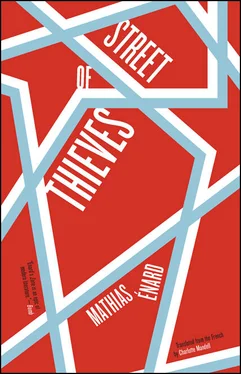His explanation was actually convincing, but Mounir raised an objection: that has nothing to do with it, look at France. They don’t know how to play soccer, they don’t have a decent team, but they still have girls with beers in the bars.
“Yes, that is troublesome,” I said. “But France already won the World Cup. So you can establish a positive correlation between the general socceristic level and the number of females in bars.”
“Doesn’t the African Cup count?”
“For Tunisians, maybe; you Moroccans lost in the finals because there weren’t enough chicks in your bars, no doubt about it. Plus now we have freedom, and you don’t.”
“True, and Egypt’s won the African Cup so often that Cairo is famous for its bikini-wearing supporters, who shout and throw beers at the screen during the rebroadcasts.”
“Just look at the seventy supporters who died in the last match in Egypt, it was exclusively women, and cute ones at that, apparently.”
“Who won the African Cup this year?”
“Zambia.”
“Are you messing with me? Where is that, Zambia?”
“Those must be some girls they have in their cafés.”
We laughed a lot. It did good to forget the daily petty thefts, the dishwashing in restaurants, the bags of cement, or simply exile.
The unity of the Arab world existed only in Europe.
The next morning, the whirr of a helicopter woke me up. A helicopter that was circling, quite low, above the center of Barcelona — we would hear it for twenty-four hours. We had gone to bed late, with our jokes about beers, girls, and soccer, we had even smoked a pair of joints together before going to sleep and all of a sudden I had completely forgotten there was a general strike. Strange idea, in any case, a general strike, planned, organized, with a fixed date, and for only twenty-four hours. If refusal to work has a weight, I thought from the height of my twenty years, it’s in the length of time, in the threat of its continuation. Not in Spain. Here the unions fought against the government for a single day, just one, and by dint of numbers: their leaders viewed the strike as a success or a failure not because they had achieved anything, which would have been a real success, but when they reached such-or-such a percentage of strikers. So the strike was an immense success for the unions (eighty percent of strikers, hundreds of thousands of demonstrators) but also for the government: it didn’t have to stray one iota from its policy, and didn’t even offer to negotiate, on any point. I don’t even know if that idea was on the agenda. The principle of the strike was that no one goes to work, that everyone demonstrates, and that’s that. One could see that Spain was beyond politics, in a world beyond such things, where the leaders no longer gave a shit about anyone, they just announced the weather, like the King of France in Casanova’s day: my friends, the coffers are empty, today it’s the functionaries who are going to pay the price. They’ve lived too well for years, their time has come. Tomorrow, filthy weather for health. Storms over schools. Put your kids in private schools. The last remaining employees of heavy industry who haven’t died of cancer have been fired. We’ve made the job market flexible, reformed contracts. The trial period is extended to a year: if you’re shown the door after three hundred sixty-four days you don’t qualify for unemployment compensation. This backhand notion of a minimum wage is profoundly leftist and binds the hands of entrepreneurs who want to create jobs, it must be fought. The minimum wage per hour of work is now at the level of Morocco, which has just increased it: it’s too high already to compete effectively against the competition. To fight the competition we need slaves, Catholic slaves who are content with their lot. Malcontents shouldn’t vote. Malcontents are dangerous alternatives and as such are excluded from democracy, they deserve nothing but clubbings and mass arrests. The Spanish Episcopal Conference recommends Catholics to be parsimonious in matters of fertility, since a high birth rate in times of crisis unreasonably increases the expenses of the State: His Holiness Pope Benedict advocates a whole series of ecumenical measures like Mass and self-flagellation to overcome the excess of desire.
All these things were in the papers, on TV; I even saw a report one day asserting that “the fingers of black people, which are not exemplary in the quality of their manicures, shouldn’t handle condoms, since it’s dangerous, they risk puncturing them, and for that reason the Pope has forbidden blacks to use condoms; what’s more,” added the commentator, “they don’t know how to read, so aren’t up to the task of understanding the instructions, which explains,” he said, “why there is more AIDS where condoms are distributed than where they are not available.”
A real load of crap. When you heard things like that, it wasn’t the strike that loomed, but the Revolution. The media here seemed to fabricate the Kingdom from hatred, lies, and bad faith. The Spanish should have had their Arab Spring, started burning themselves alive, maybe then everything would have been different.
There was something I didn’t understand: Europe was admitting that it didn’t have the wherewithal for its development, that it was all just an illusion, that Spain in fact was an African country like the others and everything we saw, the highways, the bridges, the skyscrapers, the hospitals, the schools, the daycare centers, was just a mirage bought on credit that was threatening to be retaken by the creditors. Would everything disappear, burn up, get swallowed by the markets, corruption and the demonstrators? If that was the case, a lot of people would end up on the Street of Thieves; a lot of people would fail, change their lives, die young, for lack of money to take care of themselves, lose their savings; their children would inherit a kick in the ass, would no longer go to nice schools, but to sheds where everyone would huddle around a wood stove — no one saw that coming. You had to come from far away to imagine what this transformation would be, you had to come from Morocco, from Sheikh Nureddin, from Cruz and his corpses.
The helicopter wasn’t there for nothing, everything must have seemed more beautiful seen from the sky, which was clear that day. In the street it was quite otherwise. I hadn’t cancelled my class for the day: I was a strike-breaker. I had to go there on foot, since there was no subway. It was ten in the morning, and there were already gatherings, groups of guys with caps, flags, megaphones, and cops everywhere. Half the streets in the city were blocked off. The big brand names were closed, just a few small businesses braved the picket lines — to their detriment: I saw a baker forced to close by a dozen unhappy union members shouting “Strike, strike!” and threatening to smash in his window with axe handles, he took less than ten minutes to abdicate and give his employees the day off. On the other hand, explaining to the Chinese in the Ronda shops the concept of picketing was more complicated:
“No work today.”
“No work?”
“No, it’s a general strike.”
“We not on strike.”
“Yes, it’s a general strike.”
“We not on strike.”
“Exactly, you have to close.”
“We have to go strike?”
But in the end, used to the proletarian struggles of the Single Party, the Chinese could also recognize a big stick when they saw one, and ended up lowering their shutters, for a few hours at least.
Their job became even more clandestine than usual.
In Gràcia, everything seemed calm. The streets were bathed in the blue-tinged coolness of a spring morning; Judit was waiting for the class, I arrived a little out of breath. Elena and Francesc couldn’t make it, they lived too far away to come by foot. Judit’s mother was there, it was the first time I met her; I was introduced as “Lakhdar, my Arabic professor.” She seemed much younger than I’d have thought; she wore skinny jeans, a blue T-shirt on which was written I would prefer not to ; her name was Núria. I thought of my own mother, they must have been about the same age — but they didn’t have the same life, you just had to look at them to see that.
Читать дальше












